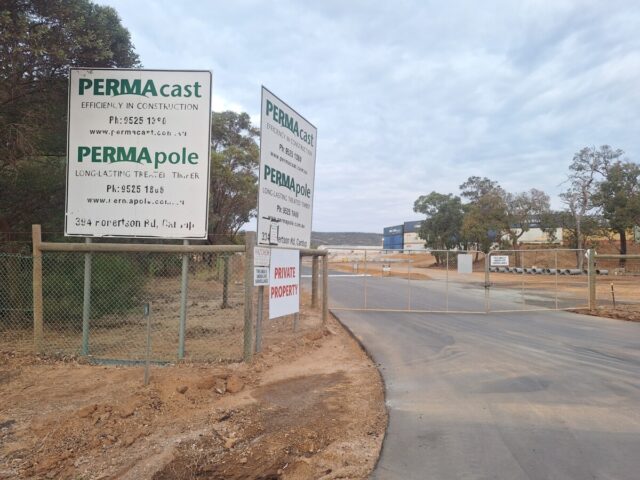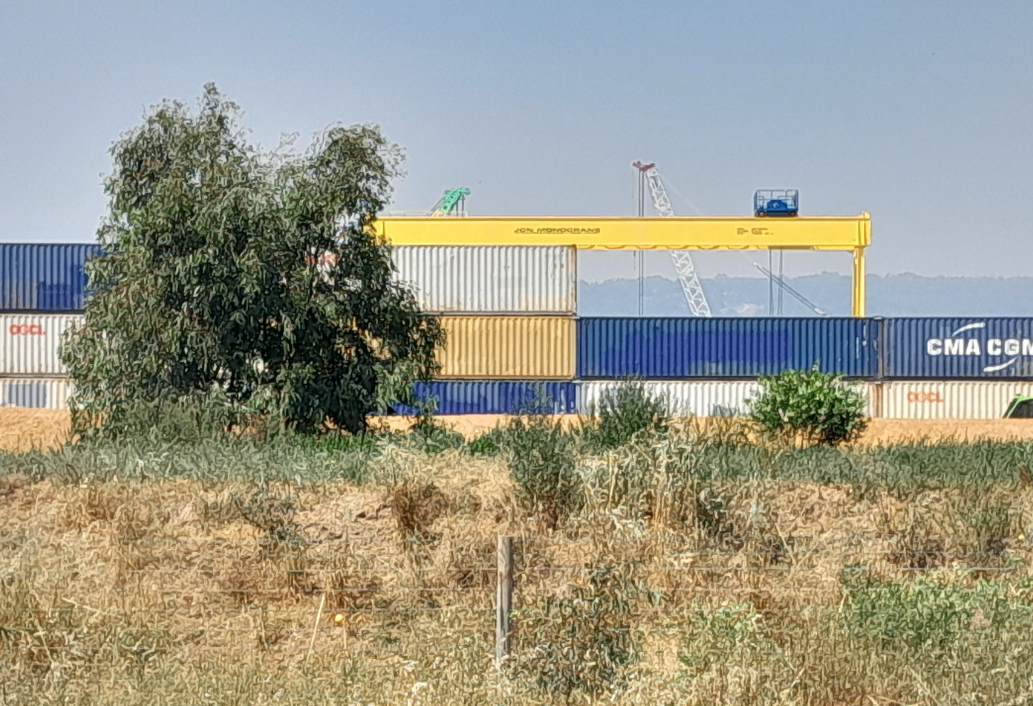
Councillors have unanimously voted to put the kibosh on Permacast’s expansion…again.
The precast concrete formwork manufacturer is currently contracted for a number of state government infrastructure projects, including the jewel in Metronet’s crown – the Byford Rail Extension.
Over the past couple of years, the plant on Robertson Rd in Cardup has grown exponentially in line with these contracts, without planning permission.
The company’s growth has been causing headaches for nearby residents who said they are struggling to live with the increase in noise, vibration and dust, amongst other concerns.
This all came to a head last year when the company was required to seek legislated permissions for its expansion.
The Department of Water and Environmental Regulation (DWER) served Permacast with a Prevention Notice in early August, which dictated the company fix its contaminated stormwater and wastewater containment, and stop using machinery or vehicles which were causing noise and dust pollution for nearby properties.
Then on August 21, the Shire of Serpentine Jarrahdale recommended refusal of Permacast’s Development Applications (DA).
The issue was heard at a September meeting of the Metro Outer Joint Development Assessment Panel (MODAP), and Permacast was granted a deferment of 30 days to try to fix its pollution issues, and provide more detailed information about management of those issues in its DAs.
Since then, Permacast has worked industriously to tick all necessary boxes.
Changes made include supplying updated management documents, altering their production process by bringing in wetter pre-made concrete rather than producing it on site and limiting the number of stressing beds in operation at any given time to one, installing a three-sea-container-high wall to block emanating sound, replacing reversing beepers on trucks with buzzers mounted closer to the ground, installing sediment traps for contaminated stormwater, and sealing the main driveway and car parking areas, among other things.

Since addressing these issues, DWER has reversed its classification of the Permacast plant as a ‘prescribed premise’ – a designation which “makes it an offence to cause an emission or discharge unless a licence or registration is held.”
This backflip means the SJ Shire is now solely responsible for ensuring Permacast complies with its DAs should they be approved.
DWER also removed all notices it had issued to the company, advising they were satisfied that “suitable noise mitigation and emission controls have been implemented”.
Despite the state government’s satisfaction, an independent peer review for the shire outlined multiple concerns with the parameters of the Environmental Noise Assessment (ENA), including the nature of the noise itself and whether it is tonal.
“The merits-based planning assessment needs to focus on not just the mere audible detection of noise, but rather whether such audible noise is unreasonable, unwarranted and thus offensive to the acceptable amenity of the locality,” the report said.
On Monday the revised development applications were brought to council again for its consideration.
Officers outlined only two options for council this time: recommending approval or a further deferral.
Neighbours of the Permacast plant implored the council to go against the officers’ options and recommend refusal again.
“Inaction is complicity,” John McEwan said, while outlining that Permacast had for years ignored local planning laws, the multitude of complaints from its neighbours, and the state-mandated protection of the Bush Forever site which abuts the plant.
“They have been eroding and denigrating this area while absorbing it into their site,” he said.
“How is this company still operating at this site? How is this happening in Australia?”
Karen McEwan said that all of Permacast’s upgrades had amounted to nothing in real terms.

“Sediment traps will not stop harmful chemical run-off from entering our groundwater,” she said.
“Stressing bed noise is still too loud as reported by peer review, but more importantly, as reported by me, while standing in my bedroom.
“As attractive as it is, the sea container wall makes no difference to the noise.
“The only change is that the bar has been lowered, and they are no longer classed as prescribed, although how it is not classed as a prescribed premise is beyond our comprehension.
“Giving them an extra 90 days will not allow them to come in line with legislation unless the bar is lowered even more.”
She said the site that Permacast occupies is just too small, and too close to its neighbours for an operation of that type and magnitude.
Julius Skinner, a partner at Thomson Geer Lawyers, spoke on behalf of his client, Permacast, and contested the shire officers’ qualms about there not being a sufficient buffer surrounding the plant.
“The recommended 750-metre buffer is in relation to a prescribed premise. That buffer does not apply to Permacast,” he said.
He also said that the noise produced by the plant had failed the requirements for it to be classed as ‘tonal’.
“The noise produced is significantly less than the ambient noise of the area,” he said, likening the noise levels experienced by residents as recorded in the ENA to that produced by “a domestic refrigerator”.
And he pointed to the company’s compliance in supplying full-time noise monitoring results to DWER “since the lifting of prohibition on production in November”.
Deputy President Tricia Duggin had one question for Mr Skinner at the end of his deputation: “Have you actually stood on Soldiers Rd yourself while Permacast is operating?”
To which he replied that he hadn’t, personally.
President Rob Coales had a further question that he directed to the 30-odd audience members in the public gallery dressed in high vis workwear: “I’m assuming that you all work for Permacast. How many of you reside in the Shire of Serpentine Jarrahdale?”
The workers seemed bewildered by the pointed question, and less than a third raised their hands.
President Coales then raised an alternate motion, to recommend refusal of Permacast’s DAs, “to ensure the amenity of local residents and ratepayers in relation to noise”.
That motion was passed unanimously.
The issue will now go before MODAP for determination at a date still to be set.













